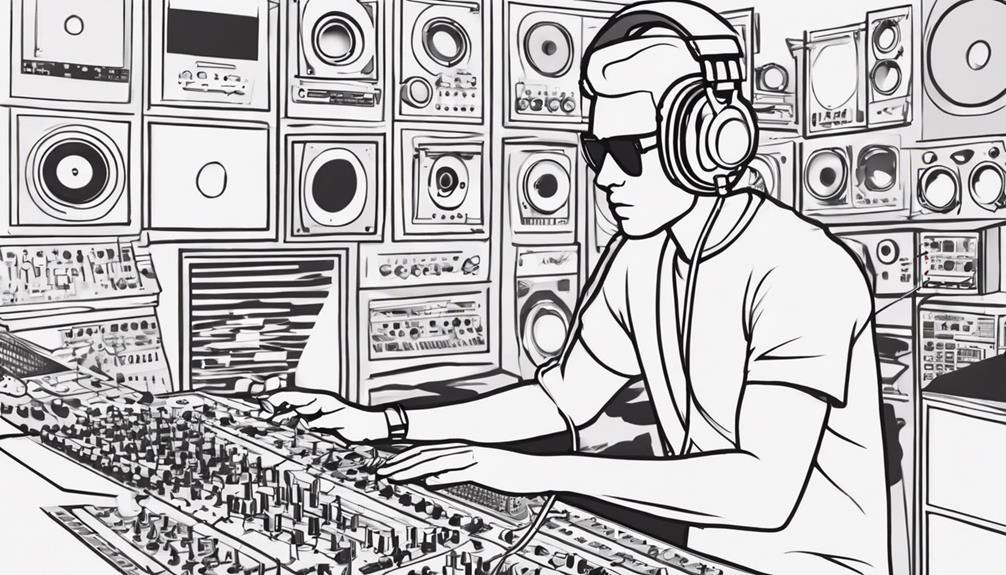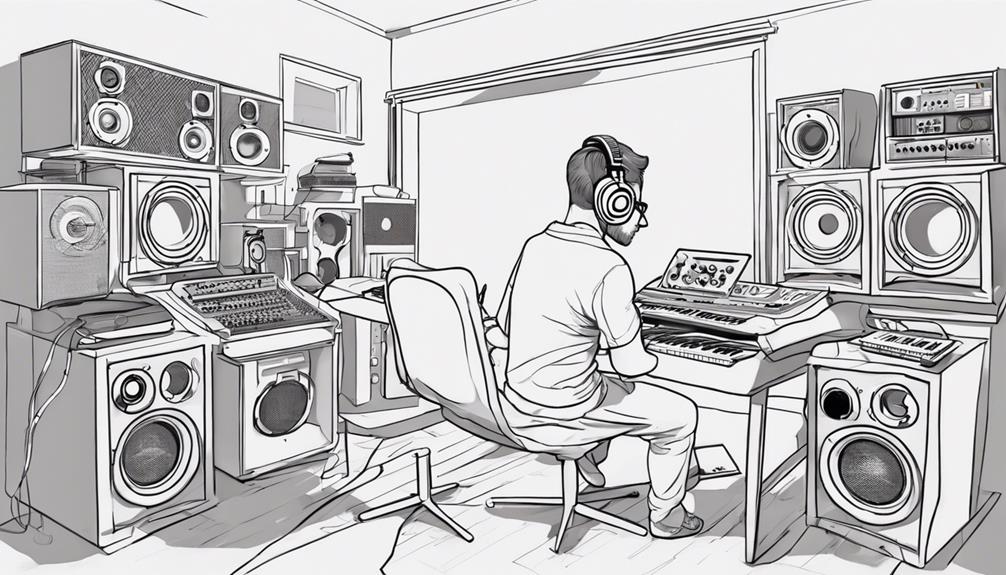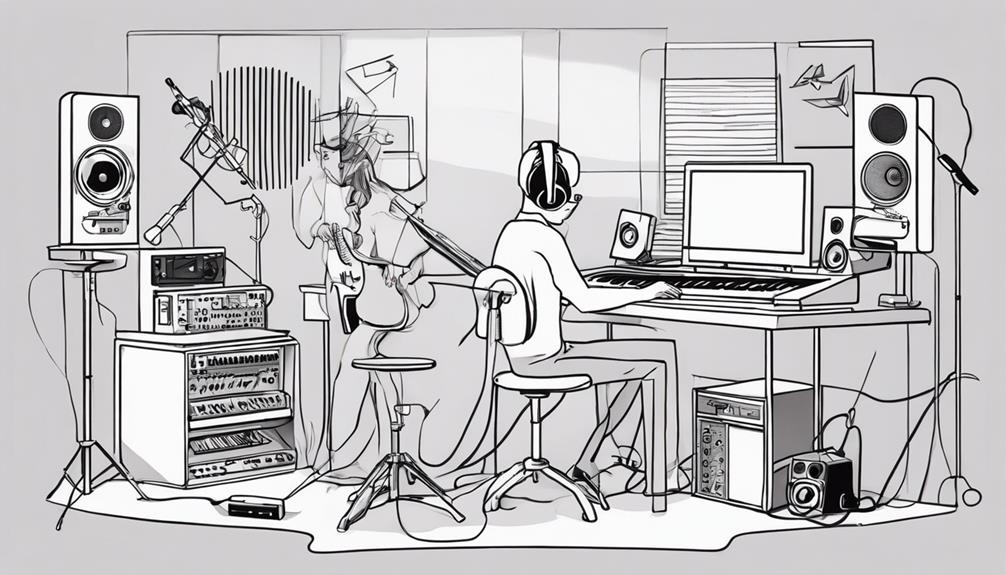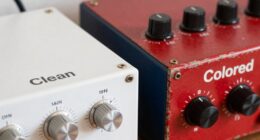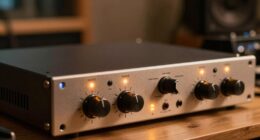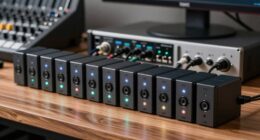Enhance your music production skills by delving into active listening techniques. Explore various musical elements, break down different genres, and dissect song structures for a deeper appreciation and skill enhancement. Immerse yourself in sound sensitivity, frequency awareness, and noise identification to elevate your production quality. Fine-tune your ear with training exercises and practical tempo analysis. Mastering music theory and developing proficiency in DAW will enrich your overall skill set. Remember, there's more to explore on improving your music production skills holistically if you're ready.
Key Takeaways
- Practice active listening techniques for musical elements understanding.
- Focus on tone, texture, and dynamics for sensitivity to sound development.
- Develop awareness of sound frequencies for balanced mixes.
- Train ears to identify and distinguish various types of noise.
- Engage in ear training exercises for improved music production skills.
Why Active Listening Is Essential
To truly appreciate music production, active listening is essential for developing a deeper understanding of sound and musical elements. Through active listening, you can engage with various genres, analyze tempos, and break down song structures to enhance your overall music appreciation.
Understanding music theory, such as tempo, rhythm, melody, and harmony, is vital for actively listening to the intricate details within a piece of music. By immersing yourself in different genres, you broaden your perception and appreciation of sound, allowing you to recognize and appreciate the unique characteristics of each style.
Practical exercises like tempo analysis and structural breakdowns further hone your active listening skills, enabling you to dissect and appreciate the complexities of a musical composition. By actively listening to music with a critical ear, you can uncover hidden nuances and gain a deeper insight into the art of music production.
Developing Sensitivity to Sound
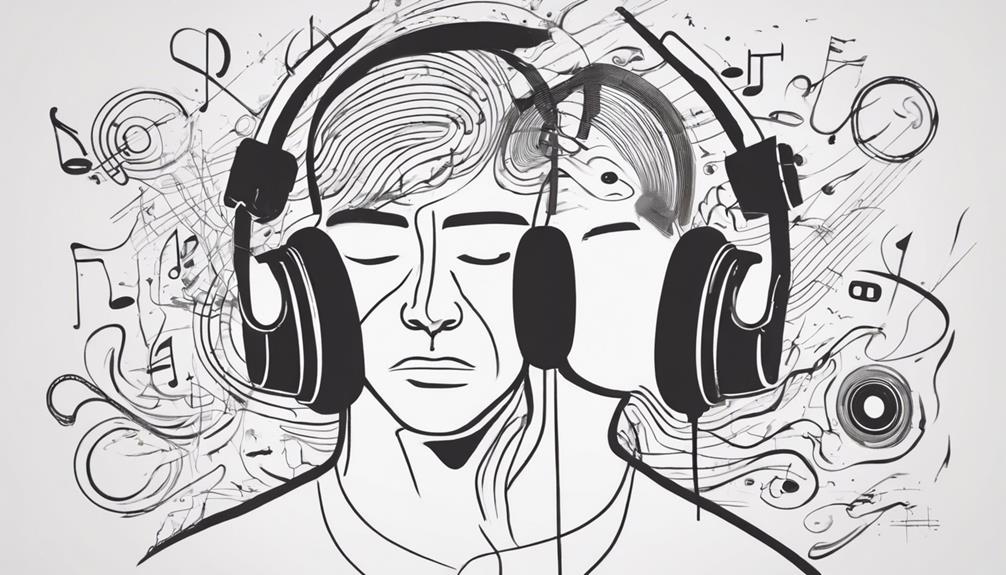
Enhance your sensitivity to sound by focusing on various aspects like tone, texture, and dynamics.
Train your ears regularly to detect subtle differences in sound frequencies and identify noise accurately.
Engage in exercises that challenge your perception and spatial awareness to develop a keen sense of hearing.
Sound Frequencies Awareness
Developing sensitivity to sound involves understanding the distinct frequency ranges occupied by different instruments in music production. Human hearing typically ranges from 20 Hz to 20 kHz, with each instrument contributing to specific frequency bands.
Low frequencies, like those produced by bass instruments, fall between 20 Hz and 250 Hz, providing depth and warmth to the music. Mid-range frequencies, encompassing vocals and guitars, span from 250 Hz to 4 kHz, adding clarity and presence to the mix.
High frequencies, such as those from cymbals and hi-hats, occupy the 4 kHz to 20 kHz range, contributing sparkle and airiness to the overall sound. By recognizing these frequency divisions and the role each plays in music production, you can develop a keen awareness of how different instruments interact within the sonic landscape.
This awareness is essential for achieving a balanced mix and creating music that sounds rich and well-defined.
Noise Identification Training
Improve your music production skills by honing your ability to identify various types of noise in your recordings. Engage in training sessions focused on noise identification to distinguish between background noise, artifacts, and unwanted sounds. By practicing this skill, you can pinpoint issues like clipping, distortion, and interference more effectively, ensuring cleaner audio outputs. Develop a keen ear for differentiating between room noise, microphone noise, and electronic noise, enhancing your overall sound perception.
Through mastering noise identification, you can elevate the quality of your audio production and eliminate distracting elements that detract from the listening experience. Pay attention to nuances in sound that may go unnoticed by untrained ears, as these can greatly impact the final product.
Ear Training Exercises
Engage in regular ear training exercises to enhance your sensitivity to sound frequencies and nuances. By focusing on identifying different elements in music production such as instruments, effects, and spatial positioning, you can sharpen your auditory skills.
Here are some tips to improve your ear training:
- Practice frequency recognition exercises to better distinguish between various sound frequencies.
- Use spectrum analyzers to visualize sound frequencies and EQ plugins to manipulate them effectively.
- Train your ears to detect subtle changes in dynamics, timbre, and spatial effects within music productions.
Understanding Musical Vocabulary

Understanding musical vocabulary plays an essential role in enhancing your comprehension and appreciation of music production. By immersing yourself in terms like tempo, rhythm, melody, and harmony, you can explore further into the music production process and improve your skills.
Music theory terms help you comprehend how different elements work together, allowing for more active listening and a richer understanding of the music being created. Whether you're investigating the intricate patterns of rhythm, the emotional impact of melody, or the depth added by harmonies, knowing musical vocabulary enables you to appreciate the nuances of different instruments and production techniques.
This knowledge not only enhances your listening experience but also empowers you to communicate effectively about music styles and production methods. So, engage with the world of musical vocabulary to elevate your understanding and enjoyment of music production.
Immersing in Different Music Genres
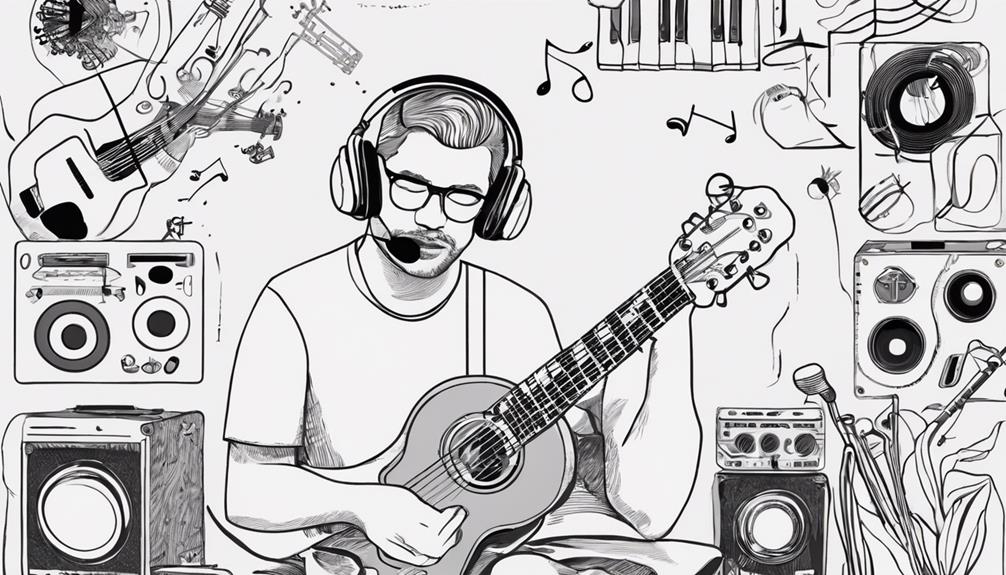
To broaden your musical knowledge and enhance your production skills, immersing yourself in different music genres is key. Here are some tips to help you make the most of exploring diverse genres:
- Listening to music:
Dedicate time to actively listen to a wide range of genres to grasp the nuances and characteristics unique to each style.
- Immersion in different genres:
Immerse yourself fully in one genre at a time, studying its production techniques, instrumentation, and mixing approaches.
- Production approaches:
Analyze how different genres approach production, such as the use of effects, layering, and dynamics, to adapt and incorporate these techniques into your own work.
- Genre-specific elements:
Pay attention to genre-specific elements like rhythmic patterns, chord progressions, and vocal styles to understand what gives each genre its distinct sound.
Learning From Music Production Experts
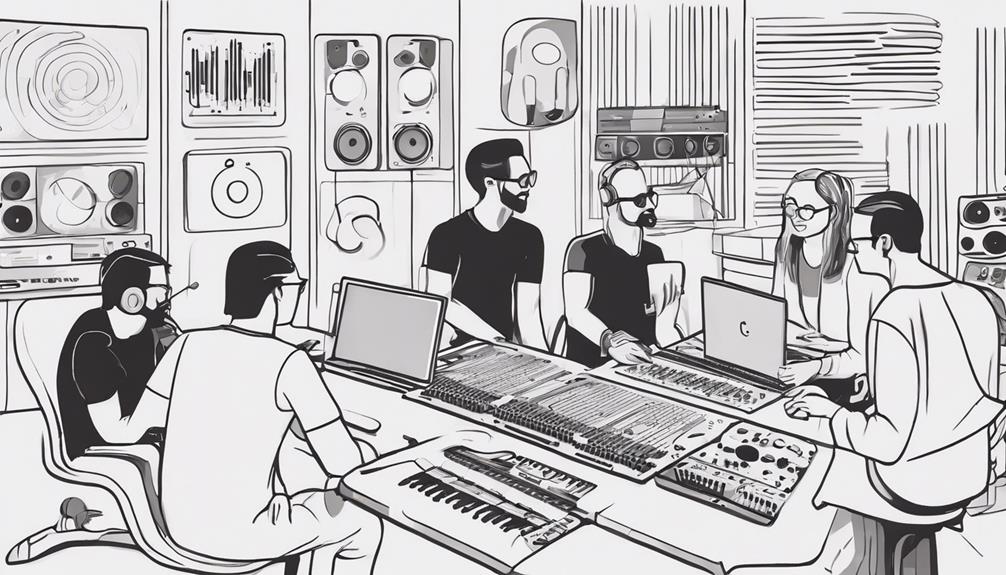
Listening to music production experts can reveal a treasure trove of insider knowledge and industry secrets. By absorbing the wisdom and techniques shared by seasoned producers, you can enhance your own production skills and take your music to the next level.
Expert insights and tips can serve as invaluable tools in your journey towards mastering the art of music production.
Expert Insights
Engage with music production experts to gain valuable insights on techniques, arrangements, and mixing approaches. Learning from experts can provide essential guidance to master DAW tools, plugins, and industry best practices.
Here are some key benefits of seeking expert insights in music production:
- Enhanced Skills: Experts offer valuable insights on sound design, audio processing, and mixing techniques, helping you improve your technical proficiency.
- Trend Awareness: Following industry professionals allows you to stay updated on new trends and advancements in music production, keeping your work fresh and innovative.
- Project Efficiency: Expert advice aids in project organization, streamlining your workflow and enhancing the overall quality of your music productions.
- Continuous Improvement: Learning from experts enables you to refine your mixing approaches, leading to continuous improvement in your music production skills.
Producers' Tips
Learn valuable music production insights by delving into the tips shared by experienced producers. Listening to music created by music production experts can provide you with a wealth of knowledge on how to develop your skills. Pay attention to the techniques, arrangements, and mixing approaches used in their tracks. By analyzing the structure and elements of their productions, you can gain valuable insights into improving your own work.
Tips from producers can help you enhance the quality of your music production. Understand the workflow and decision-making processes of successful producers to adapt their strategies into your own creations. Implementing the tricks and advice shared by industry professionals can boost your production quality significantly.
Study the evolution and growth of renowned producers to see how they've honed their craft over time, and use this knowledge to refine your own approach. Improve your skills by learning from the best in the field.
Practical Tempo Analysis Exercises
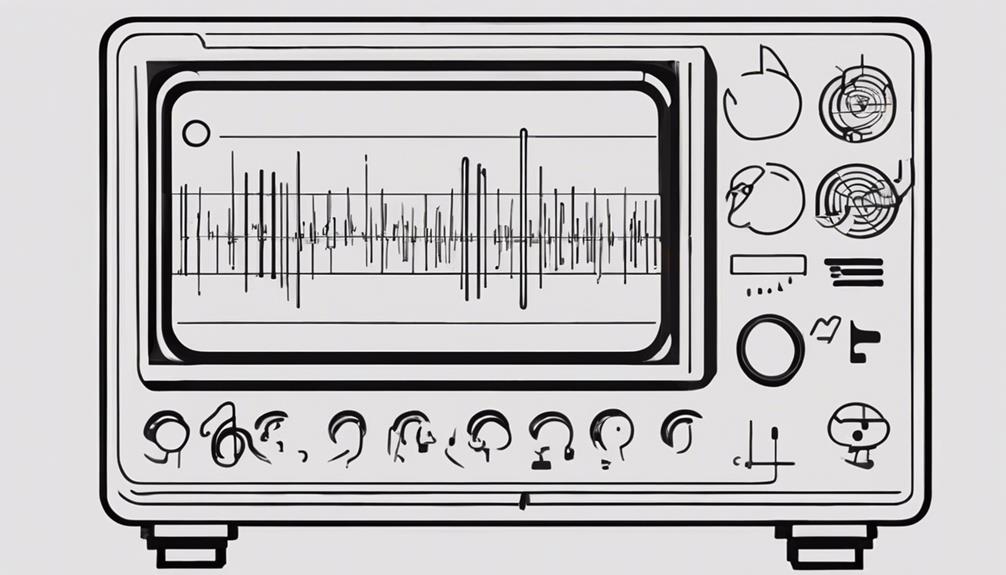
An effective way to practice tempo analysis is by tapping along to songs and counting the beats per minute (BPM) to hone your skills.
To enhance your understanding further, consider the following practical exercises:
- Use a metronome: Sync up with the metronome to grasp the tempo of a song consistently.
- Compare tempos: Analyze songs across different genres to observe how tempo influences the mood of music.
- Experiment with tempo changes: Utilize a DAW to adjust a song's tempo and explore the impact on its overall vibe.
- Verify BPM guesses: Challenge yourself by guessing the BPM of songs and then confirming your accuracy using a BPM counter tool.
Structural Analysis for Music Elements
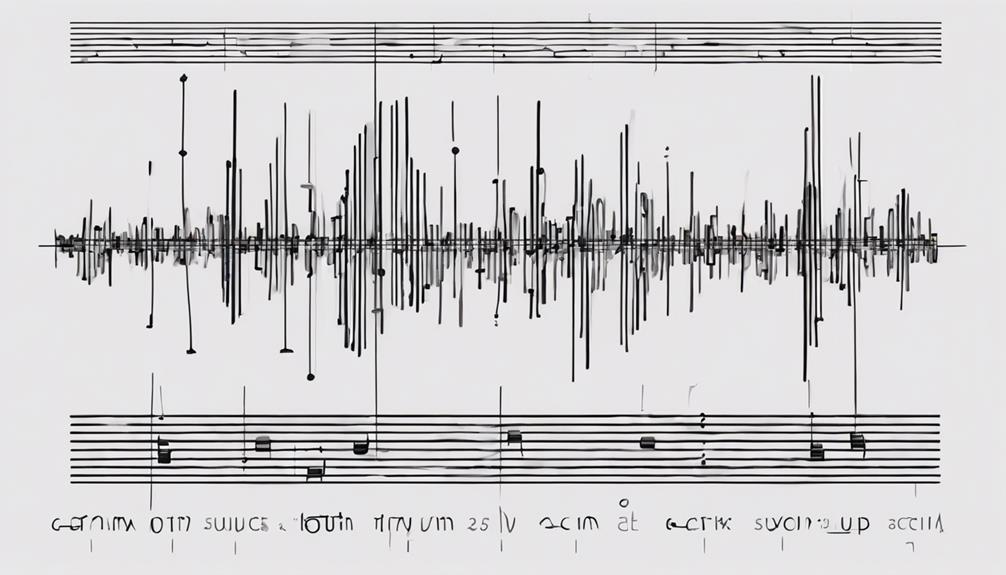
Explore the structure of a song by identifying individual instruments and visually mapping out their arrangement using a grid in your DAW. Conduct a structural analysis to break down the composition into distinct sections, enabling a deeper understanding of the overall framework.
Utilize the grid in your DAW to plot the placement and duration of each element, providing a visual representation of the song's dynamics. Pay close attention to shifts between sections, analyzing how the song flows from one part to another for a seamless listening experience.
Enhancing Music Production Skills Holistically
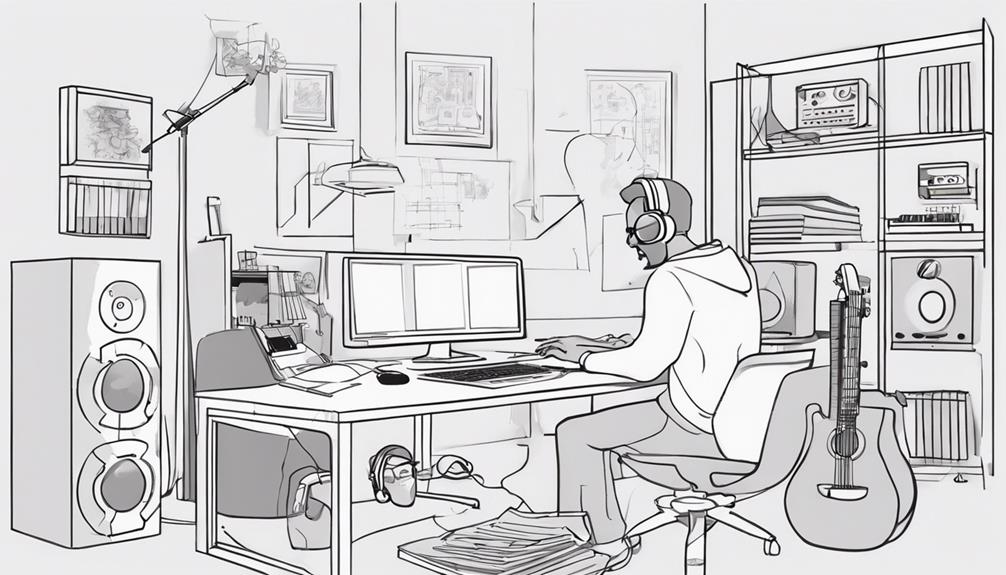
To elevate your music production skills holistically, focus on mastering music theory, DAW proficiency, and sound design techniques. Understanding music theory fundamentals can enhance your composition, arrangement, and production quality.
Proficiency in using DAWs and plugins is essential for boosting your workflow efficiency and unlocking your creative expression in music production.
Developing sound design skills will enable you to craft unique textures and signature sounds that set your productions apart.
Remember, holistic development in music production goes beyond technical skills and involves aspects like project organization, integrating feedback effectively, and continuously honing your skills. Embrace these pillars of music production to enhance your overall abilities and bring your creative visions to life.
Keep pushing yourself to learn and grow in all these areas to become a well-rounded music producer.
- Master music theory for enhanced composition and arrangement.
- Improve DAW proficiency to enhance workflow efficiency.
- Develop sound design skills for creating unique textures.
- Focus on holistic development through project organization and skill enhancement.
Consistent Practice for Improvement
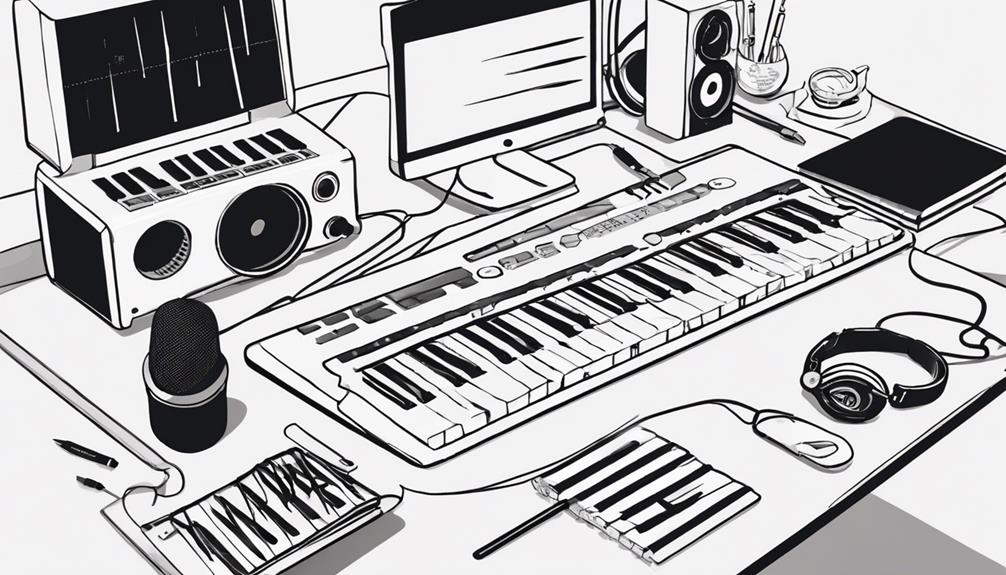
Consistent practice is the cornerstone of advancing your music production skills and refining your techniques effectively. By dedicating regular time to practice, you can enhance your creativity, proficiency, and overall skill set.
Creating a routine for practice sessions not only helps in skill refinement but also encourages exploration and experimentation. Through consistent practice, you can explore new methods, tools, and genres, leading to diverse music production experiences. This investigation is vital for growth and improvement in your craft.
Committing to a consistent practice schedule allows producers to evolve, innovate, and excel in their music production journey. Remember, the more you practice, the more you hone your skills and broaden your capabilities. So, make it a habit to engage in regular practice sessions to see significant improvements in your music production skills.
Frequently Asked Questions
Is Music Production a Skill or Talent?
Music production is both a skill and talent. While some may have innate abilities, mastering it requires dedication and practice. Understanding music theory, software tools, and creative techniques through continuous learning enhances your production capabilities.
How to Improve Your Music Knowledge?
To improve your music knowledge, explore music theory fundamentals, analyze tracks for production insights, master your DAW, investigate various genres, and engage in online resources. Enhancing these skills will elevate your music production expertise.
How Do You Develop Musical Abilities?
To develop musical abilities, immerse yourself in consistent practice, study successful producers' techniques, master music theory fundamentals, become proficient in using DAWs and plugins, and utilize educational resources. Seek feedback from peers and mentors for improvement.
How Do I Teach Myself Music Production?
Teach yourself music production by utilizing online tutorials and courses, experimenting with software and plugins, studying music theory basics, analyzing professional tracks, practicing regularly, and seeking feedback. Grow your skills and become a proficient music producer. You can also join online communities and forums where aspiring producers share tips, techniques, and constructive advice. With the vast resources available today, it’s easier than ever to learn music production online and develop your unique sound. Stay consistent, remain curious, and embrace the process of continuous learning to refine your craft.
Conclusion
To sum up, perfecting your music production skills requires active listening, sensitivity to sound, and immersion in various genres.
By understanding musical vocabulary, learning from experts, and practicing tempo and structural analysis, you can enhance your abilities holistically.
Remember, consistency is key to improvement in this creative craft!

